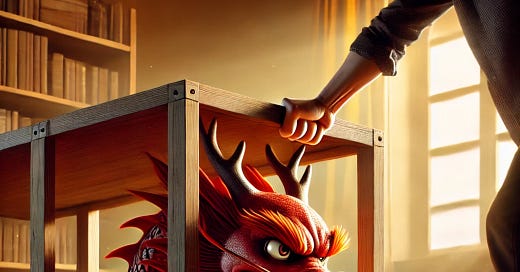I started this blog in 2021, wrote a few articles, and then spent three years as a lurker. Now I intend to start writing again, but I am no longer interested in emphasizing my Chinese diaspora identity. So this handle doesn’t work anymore. Stay tuned for the positive rebrand, but the tl;dr is that worn-out nationalism feels like last year’s fashion.
Note that I’m neither denouncing my previous beliefs nor performing a dramatic U-turn where I become a “China hawk” or something equally ridiculous. What actually happened is that I’ve moved around the country, grown into a different stage of life, and watched the Overton Window shift. New times present new opportunities!
The 2010s: a Sinotriumph cut short
The 2010s were an exciting decade for a late millennial Chinese-American. By the GDP statistics, the United States was crushing Europe, and China was close behind. Economic power seemed ripe to convert into military power. Bicultural, tech-forward people seemed especially primed to reap asymmetric rewards. In a word, Sinotriumph.
Looking back from the future, we can say that the 2018 Trump trade war and “zero Covid” safetyism (2020-2022) seriously crippled China’s growth trajectory. But during the heady Obama years, “deglobalization” seemed unimaginable. “Chimerica” was the rage, and fashionable urbanites were signing their kids up for Mandarin Montessori.
Plus, there was a bit of esoteric pleasure in knowing that, relative to its human capital stores, China still had a lot of room to grow in terms of strength and influence. The “liberal institutions” establishment (blank slatists/“magic dirt” fans, to put it meanly) would have to eat some humble pie, and may even start to respect Asian people.
Diligent strivers don’t get no respect
Forgive me the elision between “Chinese” and “Asian”; and the elision between the status of Asian-Americans and American attitudes towards various countries in Asia. These concepts are certainly related, and I am trying to represent or recreate how I felt at the time, but I don’t allow myself the same conceptual “blurriness” today.
For example, self-appointed “Stop Asian Hate” leaders deliberately conflate insulting Tweets (attributed mostly to White people) with violent attacks (attributed mostly to Black people) to promote an anti-White and pro-Black message to Asians. But is it really of equal importance to feel physically safe as it is to not hear insulting speech?
The social ecology of the university that I attended encouraged this confusion. Plainly, every antiwhite utterance was praised and every antiblack utterance was punished. I can’t say that my thoughts were 100% aligned with the external incentives, but I needed to stay in good standing with my school, friends, and future employers.
Ain’t it good to be on your own?
US politics became more volatile from the social media boom in 2014. On the left, we got the “Hands Up Don’t Shoot” hoax and the nonbinary gender fad; while on the right, the “meme magic” euphoria around the 2016 election of Donald Trump died in the 2017 Charlottesville debacle. I checked out of politics and focused on graduating.
When the COVID-19 pandemic hit, I again felt some sort of ethnocentric haughtiness from having heard about it sooner (in 2019, as opposed to 2020) since I liked to keep up with events in China. Early on, the effective control measures implemented by Asian countries (but ignored in US reporting) fueled my bullishness on “science” and China.
My ethnic or racial identity was also salient at this time because I was living in a rural and near-exclusively White area in the Midwest. Trump had launched a “trade war” against China, and talked about how China was “raping” America on the news. Still—however paranoid as I was during this time—I was not in physical danger.
Ask not what BLM can do for you…
It was the perfect storm for me to get caught up in the collective psychosis of Floyd-worship. I was living far from the multicultural, urban area where I had attended school and where my woke friends lived. I had also gone through a bad breakup. It was lockdown, and the rioters were going to be the vanguard of “the revolution!”
Not only was I was writing inflammatory pro-BLM posts on my social media, but also I was starting to irritate my coworkers and roommates and everyone around me IRL. My bizarre mix of oversocialized contrarianism only stopped when I got myself into a psychotherapist’s chair and started dealing with the practical problems of daily life.
Once I had a touch of emotional stability and financial stability, my thinking about political values became sharper. I began to cut commentators from my reading list who tended to conspiracy theories, zero-sum thinking, and tribalism. Today, I’m more motivated by curiosity and empiricism than by carrying water for any ideology.
On the internet, nobody knows you’re Chinese
Although I’ve so far written mostly about my own choices when it comes to affiliation, I should also mention that the government of China has, in the past few years, put more restrictions on travel and other connections from itinerants, the diaspora, etc. I stopped using Douyin (TikTok) when it started requiring a local phone number.
Likewise, I remain mildly motivated to see Asian Americans (especially the men) have some prolific wordcel advocate for “their”/“our” issues. But as Douglas Kim found (from being deplatformed for being insufficiently feminist), the bullying and conformism within the few AA “intellectual” spaces makes one wonder, why bother?
I haven’t really engaged with writers here as much as I’ve wanted to, because this identity feels like a prison. I can’t fulfill the demand to be an upstart Carl Zha to an up-and-coming Noah Smith because I don’t agree with Carl anymore. If this means that I need to build an audience on generating actually interesting ideas, so be it.


